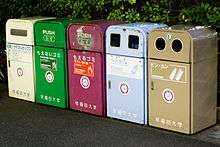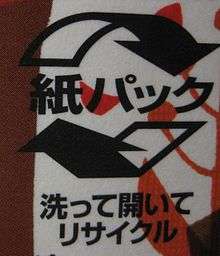Recycling in Japan

Recycling in Japan (リサイクル Risaikuru) is based on the Japanese Container and Packaging Recycling Law. Plastic, paper, PET bottles, aluminium and glass are collected and recycled. Japan’s country profile in Waste Atlas shows that in 2012 Recycling Rate was 20.8%.[1] Other sources have a higher rate of recycling for Japan, such as Appropedia putting it at 50%.[2]
Container and Packaging Recycling Law
Also called Law for the Promotion of Sorted Collection and Recycling of Containers and Packaging, has been enforced since April 1997 by the Ministry of the Environment to reduce the waste of glass containers, PET bottles and paper cartons. Since April 2000 plastic containers and packages other than PET bottles have been included.[3] According to the law, the recycling is conducted by the Japanese Container and Package Recycling Association (JCPRA) (財団法人日本容器包装リサイクル協会 Zaidan-hōjin Nihon-yōki-hōsō-risaikuru-kyōkai), a government-designated organization established September 25, 1996.[4]
| Product | Volume of recycling tons | Change since 2000 | Recycling unit costs ¥ / kg | Change since 2000 |
|---|---|---|---|---|
| Glass bottles, no color | 155,076 | -16.04% | 4.1 | -1.23% |
| Glass bottles, brown | 133,560 | +43.62% | 5.5 | -28.40% |
| Glass bottles, other | 107,383 | +10.09% | 9.2 | +13.64% |
| PET bottles | 257,906 | +167.03% | 1.7 | -98.09% |
| Paper | 33,934 | -29.03% | 13.3 | -77.32% |
| Plastics | 853,581 | +463.53% | 65.7 | -37.43% |
- The consumers are required to follow sorting guidelines established by the municipalities.
- The sorted waste is then collected by the municipalities and stored for collecting by the recycling company.
- Manufactures and business entities using containers and packages have to pay a recycling fee to the JCPRA, in accordance with the volume they manufacture or sell.
- Each year recycling business entities are selected by a public bidding in every local municipality where a waste storage site is located. They are assigned to collect and transport the waste from the storage sites to recycling facilities. To make sure the waste is getting recycled, these recycling business entities receive payment only after showing a delivery report, signed by the recipient of the recycled products.
Recycling of steel cans is not regulated by the law, but in 2006 about 99% of the municipalities collected and recycled them.[6] In 1973 the Japan Steel Can Recycling Association (スチール缶リサイクル協会 Suchiiru-kan Risaikuru kyōkai), a non-profit organization to promote the recycling of steel cans, had been established. According to its statistics 88.1% of steel cans have been recycled in 2006, maintaining the world's highest level.[6]
Other recycling laws
- Home appliance recycling law (特定家庭用機器再商品化法 Tokutei Kateiyō Kiki Saishyōhinka Hō) - enacted June 1998, enforced April 2001
- Construction material recycling law (建設工事に係る資材の再資源化等に関する法律 Kensetsu Kōji ni kakaru Shizai no Saishigenka tō ni kansuru Hōritsu) - enacted May 2000
- Food recycling law (食品循環資源の再生利用等の促進に関する法律 Shokuhin Junkan Shigen no Saisei Riyō tō no Sokushin ni kansuru Hōritsu)
- End-of-life vehicle recycling law (使用済自動車の再資源化等に関する法律 Shiyōzumi Jidōsha no Saishigenka tō ni kansuru Hōritsu)
- Law for the promotion of effective utilization of resources - enacted May 2000, enforced April 2001
Symbols

 | Paper (紙 Kami) |
| | Plastic (プラ Pura) |
| | Aluminum (アルミ Arumi) |
| | Steel (スチール Suchiiru) |
 | PET bottles |
Recycling plans
On March 25, 2008 the Japanese Cabinet approved a plan that targets to reduce the total waste from about 52 million tons in 2007 to about 50 million tons in 2012 and to raise the waste recycling rate from 20 to 25%. Thermal recycling and a charging system for waste disposal services will be promoted.[7]
3R Initiative
This G8 initiative, first proposed at the G8 Summit in June 2004, aims to Reduce, Reuse and Recycle waste.[8] At the G8 Environmental Minister Meeting in Kobe on May 24–26, 2008, the ministers agreed about the Kobe 3R Action plan. It intends to improve resource productivity, to establish an international sound material-cycle society and to bring forward 3Rs capacity in developing countries.[9][10] According to this plan, Japan also announced a New Action Plan towards a Global Zero Waste Society, aimed to establish material cycle societies internationally.[11]
Scandals
In January 2008 five paper companies in Japan were accused of misleading customers about the recycled paper content of their products. Oji Paper, the largest paper company in Japan, admitted that its copy and print paper contained 5 to 10% recycled paper, instead of the 50% stated. The president of Oji Paper apologized to its customers, and the president of Nippon Pages, the second largest paper company in Japan, resigned to take responsibility. The Japanese Fair Trade Commission said it would investigate.[12]
See also
- Recycling
- Mottainai - common Japanese expression, often used in this context
- Electronic waste in Japan
References
- ↑ Waste Atlas(2012). Country Data: JAPAN
- ↑
- ↑ "Container and Packaging Recycling Law" (PDF). Ministry of the Environment, Japan. 2005-01-05. Retrieved 2008-11-16.
- ↑ "JCPRA Profile". JCPRA. Archived from the original on October 26, 2008. Retrieved 2008-11-16.
- ↑ "Recycling statistic". JCPRA. Retrieved 2011-02-19.
- 1 2 "Japan Maintains World's Highest Steel Can Recycling Rate: 88.1% in 2006". japanfs.org. 2007-11-09. Retrieved 2008-11-17.
- ↑ "MOE Sets Targets to Reduce Waste, Increase Waste Power Generation and Recycling by 2012". japanfs.org. 2008-09-21. Retrieved 2008-11-16.
- ↑ "The 3R Initiative". Ministry of the Environment, Japan. 2008-05-27. Retrieved 2008-11-16.
- ↑ "G8 Environmental Minister Meeting". Ministry of the Environment, Japan. 2008-05-25. Retrieved 2008-11-16.
- ↑ "Kobe 3R Action Plan" (PDF). Ministry of the Environment, Japan. Retrieved 2008-11-16.
- ↑ "Japan's New Action Plan towards a Zero Waste Society" (PDF). Ministry of the Environment, Japan. Retrieved 2008-11-16.
- ↑ McCurry, Justin (2008-01-18). "Recycling scandal hits Japan". London: guardian.co.uk. Retrieved 2008-11-16.
External links
| Wikimedia Commons has media related to Recycling in Japan. |
- The Japan Containers and Packaging Recycling Association
- Ministry of the Environment, Japan
- 3R Initiative on the Ministry of Environment homepage
- Japan for Sustainability
- PC 3R Promotion Association
